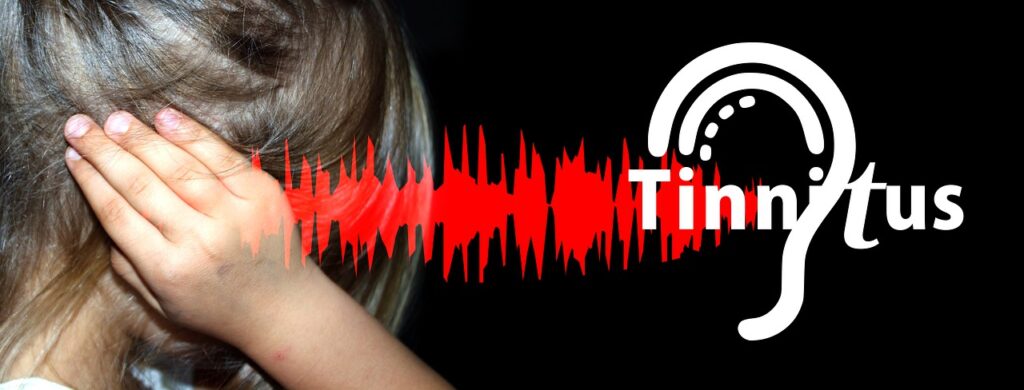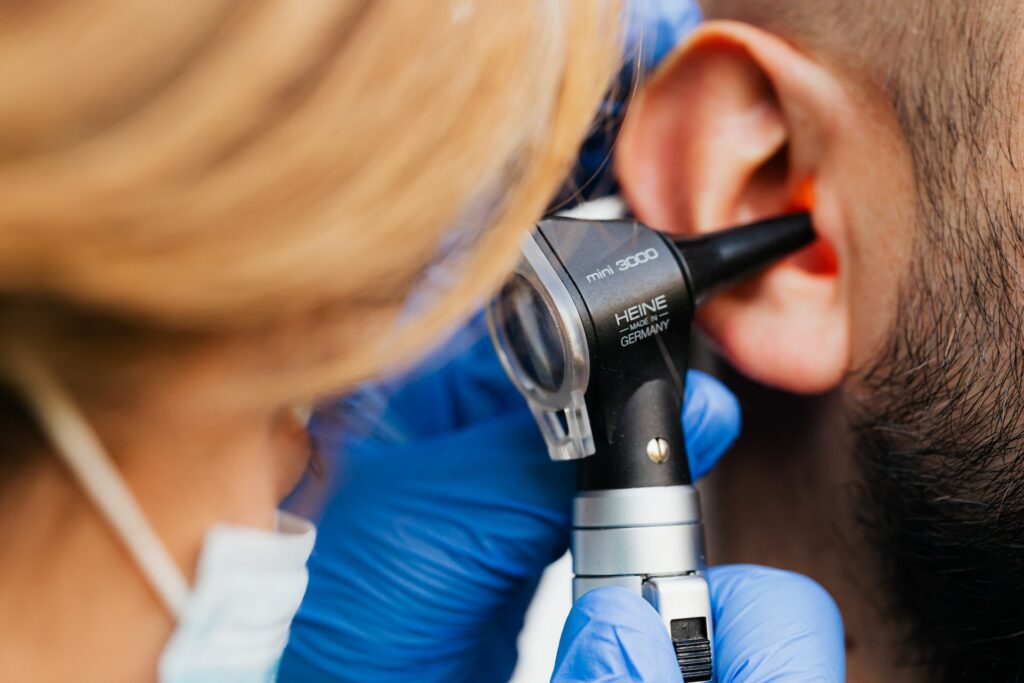Nebula Genomics DNA Report for Tinnitus
Is tinnitus genetic? We created a DNA report based on a study that attempted to answer this question. Below you can see a SAMPLE DNA report. To get your personalized DNA report, purchase our Whole Genome Sequencing!

Table of contents
What is Tinnitus?
The term tinnitus refers to a common condition that causes ringing in the ear. It can affect anyone although it is most common for older adults. The sound can range from mild to severe and interfere with daily activities, such as sleeping, concentrating, and communicating. The perception can also vary from person to person, with some describing it as a low-pitched humming and others as a high-pitched screeching.

There are two forms of tinnitus: subjective and objective. Subjective tinnitus is the most common type and only the affected individual can hear it. It can be low or high pitch and can affect either one or both ears.
On the other hand, objective tinnitus is rare. A healthcare professional may be able to detect it during an examination. If this occurs, it is usually pulsatile tinnitus which sounds like a pulsing or whooshing sound in the blood vessels. Abnormal blood flow around the ear often contributes to this perception.
While there is no known cure, various treatments can help treat the underlying condition and manage symptoms. Treatment options can include sound therapy, which involves using external noise to reduce the perception of the condition, and cognitive behavioral therapy, which can help change negative thought patterns associated with tinnitus.
Is Tinnitus Genetic?
For many years doctors attributed tinnitus to ear damage caused by exposures such as loud noises. However, there is now some evidence that genetic influence also contributes to the development of tinnitus in some cases. When caused by genetics, tinnitus is most likely a polygenic condition, or caused by more than a single nucleotide polymorphism. It is also most likely a combination of genetic and environmental factors play a role.
In particular, there appears to be a strong link between bilateral tinnitus and genetic factors, especially in males. That is, this genetic study showed that a majority of male twin pairs had the condition. Since identical twins have the same genetic makeup this indicates that the condition could be hereditary. The authors did not see this same pattern in females.
Further genome-wide association studies (GWAS) have since identified additional genetic links. This study published in 2020 discovered eight potential risk genes including COL11A1, GRK6, MFHAS1, MSRA, XKR6, C8orf12, AF131215.5, and BLK.
A similar study using data from the UK Biobank in 2021 also suggested various locations on the RCOR1 gene as areas for further research regarding the genetic associations with tinnitus.
While a combination of genes is most likely involved, some studies suggest that minor allele frequencies in single genes may be associated with related conditions in tinnitus patients.
More investigations need to be conducted on these and other candidate genes for scientists to get a better idea of how prevalent hereditary tinnitus is and the best modes of treatment.
Epidemiology
Approximately 14% of adults worldwide experienced tinnitus in 2022. The National Institute on Deafness and Other Communication Disorders (NIDCD) estimates the prevalence to be about 10% in the United States, which is equivalent to over 25 million people. While it can occur at any age, it is more prevalent among older adults. Men are also more likely to experience tinnitus than women.
Individuals with prolonged exposure to loud noises, such as those working in construction, music, or other noisy environments, are at a higher risk of developing tinnitus. It can also be a symptom of underlying medical conditions, including hearing loss, ototoxicity, head and neck injuries, and even more severe medical conditions such as brain tumors or vascular disorders.
Symptoms
The manifestation of tinnitus can vary widely between individuals. Most people describe it as ringing in the ears. However, the sound can take many forms, including ringing, buzzing, hissing, roaring, clicking, whistling, humming, or pulsing.

The sounds may come and go or be chronic. Moving your head, neck, or eyes, or touching certain parts of your body can change how you perceive the sound.
Hearing loss and tinnitus often go hand in hand, especially in cases where damage to the inner ear causes the condition. An ear infection may also signal a problem that could lead to tinnitus.
Other symptoms that may accompany the condition include vertigo, ear pain or pressure, sensitivity to sound, and difficulty sleeping or concentrating.
Long term effects may include psychiatric conditions such as anxiety, depression, irritability, and other mental health complications.
Causes
Experts do not fully understand the cause. However, experts have linked a variety of factors to tinnitus, including environmental, genetic, and medical. Many experts believe the condition occurs when damage to the inner ear changes the signal carried by nerves to the parts of your brain that process sound.
Exposure to loud noises, such as those from music, firearms, or heavy machinery, can damage the inner ear and lead to tinnitus. This effect is also why it is the most common condition diagnosed after service-related positions that often chronically expose people to the sound of gunfire.
Age-related hearing loss, head or neck injuries, ear cell damage, ear infections, or wax build can also trigger tinnitus.
Tinnitus may be a side effect of certain medications, especially if taken at high doses. These include non-steroidal anti-inflammatory drugs (e.g., ibuprofen, naproxen, and aspirin), certain antibiotics, anti-cancer drugs, anti-malaria medications, and antidepressants.
Less common medical conditions that can cause the condition involve other health problems and chronic conditions. For example, Meniere’s disease is an inner ear problem that can cause balance problems and hearing loss.
Some causes of tinnitus do not involve hearing loss. These include temporomandibular joint (TMJ) disorders, a condition caused by muscle and joints inflammation. Problems with the jaw joint can also cause tinnitus, as well as pain in the jaw, face, and neck.
Rarely, the condition can be caused by vestibular schwannoma (acoustic neuroma), a benign tumor, on the auditory nerve or a vascular tumour in the middle ear.
Other chronic conditions such as diabetes, migraines, thyroid disorders, and certain autoimmune disorders such as lupus and multiple sclerosis have been linked to tinnitus.
In addition, certain lifestyle factors such as smoking, excessive alcohol consumption, and stress, are risk factors associated with an increased chance of developing tinnitus.
Pulsatile tinnitus
Pulsatile tinnitus, when you hear whooshing caused by blood rushes, is typically caused by anemia or atherosclerosis. People with high blood pressure are at higher risk.
Identifying the underlying cause is essential to help guide appropriate treatment and management options.
Diagnosis
A doctor usually makes a diagnosis based on the patient’s symptoms. However, they will perform additional tests to determine the cause and guide appropriate treatment. These tests involve an evaluation of the patient’s medical history, physical examination, and hearing tests.
During the physical exam they will most likely check for earwax buildup or other blockage in the ear canal. Sometimes, they cannot determine a cause.

Common tests include a hearing test in which the patient will sit in a soundproof room wearing earphones that transmit specific sounds into one ear at a time. They will indicate when they can hear a sound and the doctor will compare the results to typical people of their age. Doctors may also perform a tympanometry in which they check your eardrum with a handheld device that produces a diagram.
Moving tests will assess whether the tinnitus worsens with certain movement. This result may indicate an underlying disorder.
If the doctor suspects another condition they may recommend imaging tests such as CT or MRI scans and blood tests to look for anemia, thyroid problems, heart disease or vitamin deficiencies.
Treatment
Tinnitus treatment depends on the underlying cause and the severity of the symptoms. In some cases, the tinnitus may go away on its own, especially if it is related to temporary factors such as noise exposure or medication use. However, treatment may be necessary if the tinnitus is persistent or severe.
Tinnitus can be a symptom of an underlying condition, which your doctor may take steps to treat. This includes earwax removal if the tinnitus is caused by a blockage, hearing aids if it is a result of age-related hearing loss, and changing medications.
There is no cure for tinnitus but doctors may use several strategies to reduce it’s impact such as:
Sound therapy: Patients using external sounds, such as white noise or music, to help mask the tinnitus and make it less noticeable. White noise sound generators are an especially popular product for this purpose.
Relaxation techniques: This approach may reduce stress and make the condition less noticeable. Some patients may be encouraged to try yoga, tai-chi and meditation.
Counseling: Behavioral therapy can help patients change their negative thoughts and feelings about tinnitus and learn coping strategies to manage their symptoms. A different kind of counseling, tinnitus retraining therapy (TRT), combines sound masking and counseling from a trained professional. This treatment may help dampen the symptoms and cause less anxiety for the patient.
Medications: Certain medications, such as antidepressants or antianxiety medications, may be prescribed to help manage the tinnitus-related distress associated with the condition. There are no drugs to treat tinnitus.
It’s important to note that tinnitus has no cure, but treatment can often help manage the symptoms and improve the patient’s quality of life.
If you liked this article, you should check out our other posts in the Nebula Research Library!
July 28, 2023
